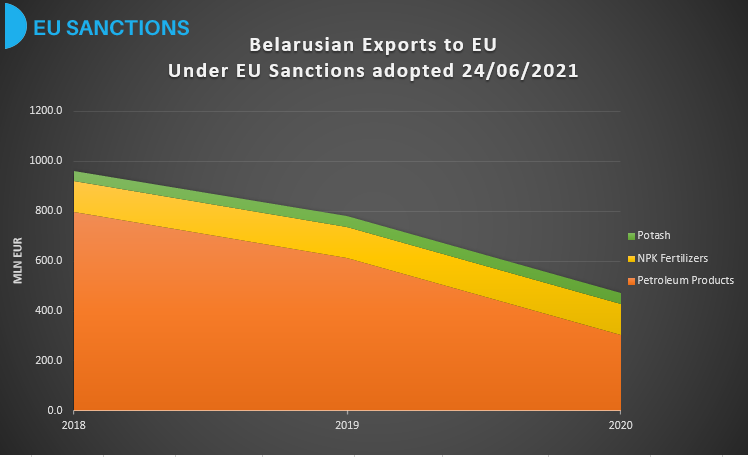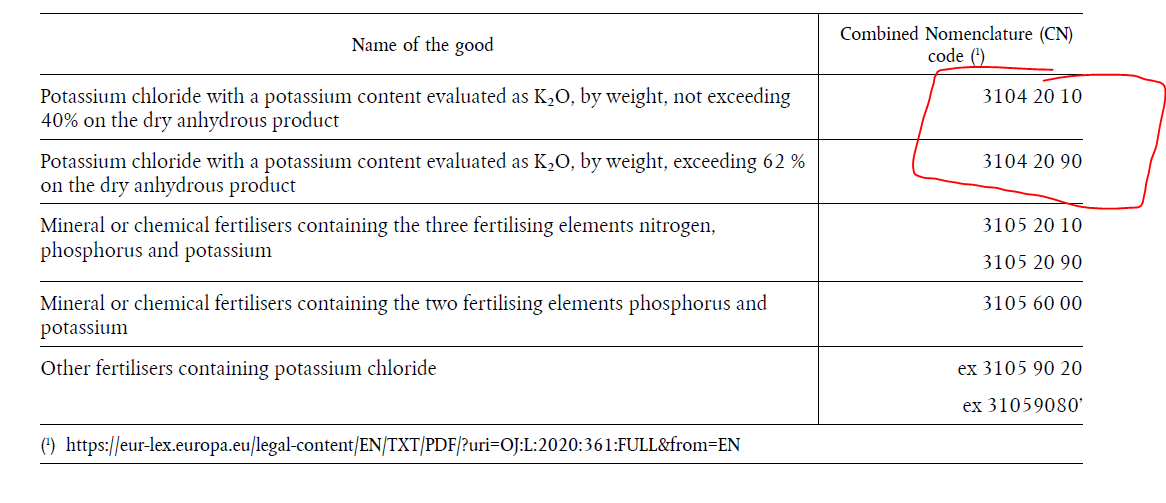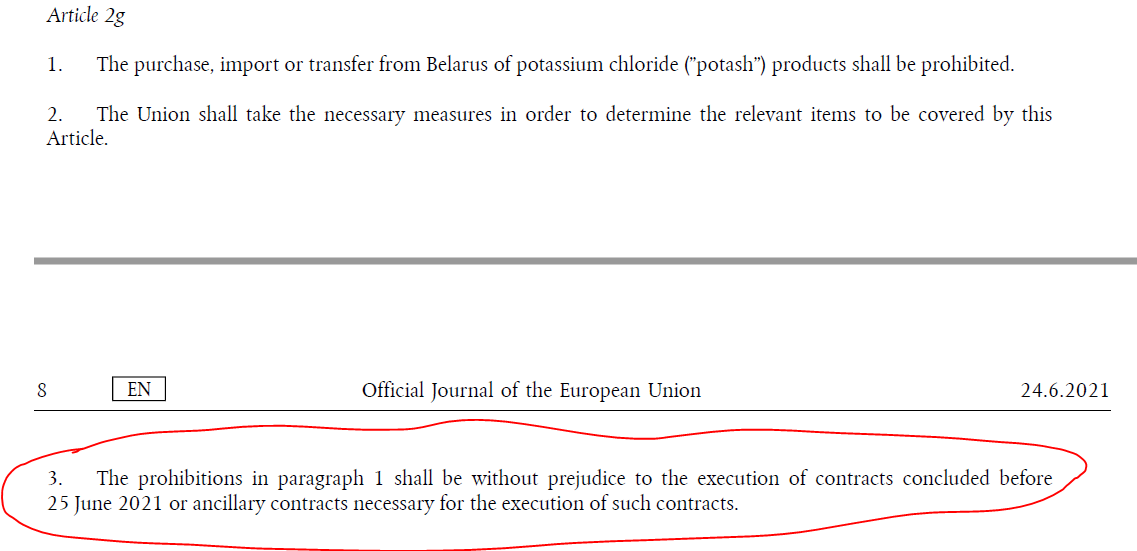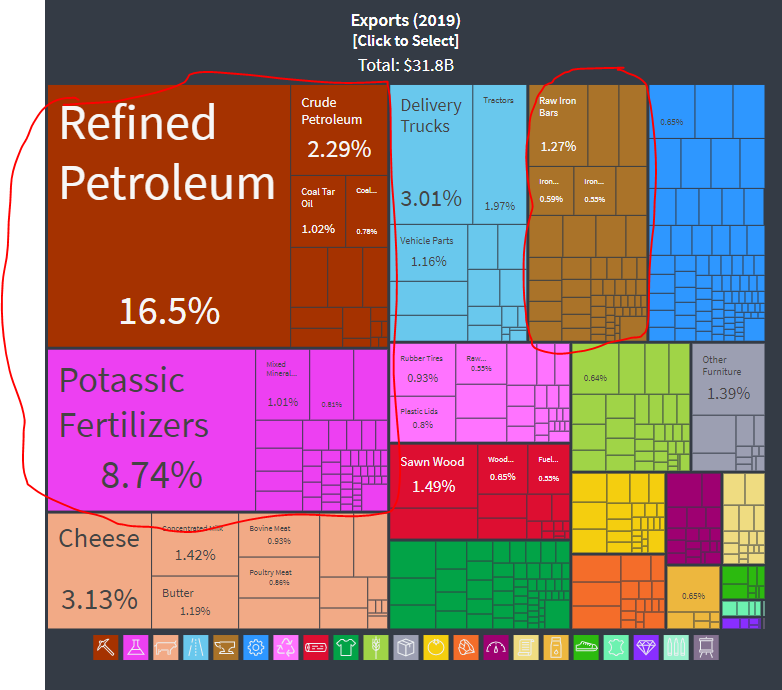
Today, EU finally imposed further economic #sanctions on #Belarus, perhaps finalizing EU's multi-prong reaction to the hijacking of RyanAir flight on May 23rd.
This (long) thread will analyze where we are today and what actually has been achieved. (thread)
This (long) thread will analyze where we are today and what actually has been achieved. (thread)
The previous situation is described here. 👇
Prior to RyanAir incident, EU had (1) asset freezes, (2) visa/entry bans; (3) arms embargo, (4) ban on exports of equipment used for internal repression. /1
Prior to RyanAir incident, EU had (1) asset freezes, (2) visa/entry bans; (3) arms embargo, (4) ban on exports of equipment used for internal repression. /1
https://twitter.com/TomWlost/status/1396573335346163713?s=20
Following the RyanAir incident, the EU reacted in three steps:
- June 4: banning of Belarusian air flights from EU airspace;
- June 21: massive expansion of asset freezes & visa bans; and
- June 24: significant expansion of economic sanctions. /2
- June 4: banning of Belarusian air flights from EU airspace;
- June 21: massive expansion of asset freezes & visa bans; and
- June 24: significant expansion of economic sanctions. /2
The most immediate reaction was prohibition of Belarusian air carriers from EU airspace on June 4th. This happened by virtue of Council Decision 2021/908 and Council Regulation 2021/907. 3/ 

The next step was the finalization of the 4th wave of sanctions, which had already been in the pipeline anyway, bz of the fake Presidential elections. The RyanAir incident gave the 4th wave of sanctions new energy and the sanctions list has been significantly expanded. /4
On June 21, EU published Council Implementing Decision 2021/1002 and Council Implementing Regulation 2021/997, in which the asset freeze/entry ban list was expanded with abt 78 new persons and 7 new entities. /5 



Among new persons listed were judges (14), KGB/police/internal affairs (16) prosecutors/investigators (10), penal/correction facility personnel (12), members of parliament (4), ministry/Presidential admin (3), university staff (4), govt propagandists (2)... /6
as well as high-level govt and air force staff responsible for execution of the RyanAir hijacking (7 persons). /7
However, key on this list were 2 Lukashenka family members, 7 important Belarusian & Russian businessmen, as well as 7 additional entities (in addition to previously listed 7 entities, brining the total of companies to 14). /8
The 7 new businessmen included:
- A. Shatrou, owner of previously sanctioned Synesis LLC surveillance business;
- S. Tsiatseryn, alcohol & food sector investor (but his business BELGLOBALSTART & Vibel) haven't been blacklisted); /9
- A. Shatrou, owner of previously sanctioned Synesis LLC surveillance business;
- S. Tsiatseryn, alcohol & food sector investor (but his business BELGLOBALSTART & Vibel) haven't been blacklisted); /9
- M. Gutseriev, a Russian billionaire with investments in energy, potash, hospitality and others (but his businesses, including Slavkali, Slavneft, and others haven't been sanctioned yet).
You can read more about Gutseriev here. 👇 /9
bloomberg.com/news/articles/…
You can read more about Gutseriev here. 👇 /9
bloomberg.com/news/articles/…
- A. Aleksin, a businessman active in multiple sectors, including tobacco (important for further EU sanctions), friendly with Lukashenka family, co-owner of separately sanctioned Bremino Group; and
- A. Zaitsau, co-owner of separately sanctioned Sohra Group and Bremino Group;/10
- A. Zaitsau, co-owner of separately sanctioned Sohra Group and Bremino Group;/10
This brings the total number of businessmen to 8, as A. Shakutsin and M. Varabei had been listed previously. /11
The two family members of Lukashenka sanctioned on June 21 were his second son Dzmitry & his daughter-in-law Liliya Lushaneka. Liliya is the wife of Lukashenka oldest son, Viktar, who had already been sanctioned previously. A. Lukashenka himself is also already sanctioned. /12
It seems only his youngest son, Nikolai (16) hasn't been sanctioned yet. /13
On June 21, the EU also sanctioned 7 new entities, including:
- Sohra Group (owned by A. Zaitsau, also sanctioned);
- Bremino Group (owned by A. Zaitsau, M. Varabei and A. Aleksin, all sanctioned);
- Globalcustoms Management (associated with V. Sheiman, also sanctioned); /14
- Sohra Group (owned by A. Zaitsau, also sanctioned);
- Bremino Group (owned by A. Zaitsau, M. Varabei and A. Aleksin, all sanctioned);
- Globalcustoms Management (associated with V. Sheiman, also sanctioned); /14
- BelAZ (SOE, one of largest global manufactuer of large trucks & dump trucks);
- MAZ (one of largest SOEs in BY, producer of trucks);
- Logex (associated w/ Shakutsin, already sanctioned);
- NNK (owned indirectly by Varabei & associated w/ Aleksin, both sanctioned)./15
- MAZ (one of largest SOEs in BY, producer of trucks);
- Logex (associated w/ Shakutsin, already sanctioned);
- NNK (owned indirectly by Varabei & associated w/ Aleksin, both sanctioned)./15
It is interesting to note who hadn't been sanctioned: none of the major SOEs in the state-owned petrochemical, fertilizer, potash or steel industries. This is curious, given that these sectors had been sanctioned separately today (more on this below). /16
Reportedly, the EC/Council Legal Service has been concerned about the legality of blacklisting state-owned companies. /17
Reasons for listing of BelAz & MAZ do not rely on their nature as SOEs (so presumably, supporting Lukashenka regime and benefitting from it), but rely on these companies' role in organizing rallies for the regime and for persecuting workers striking against the regime. /18 



To be more precise, both reasons for listing mention their role as revenue generators. 👇 But clearly, more was required, mainly political involvement and persecution of protesters . /19 



This brings me to today's major escalation of EU economic sanctions on Belarus.
After weeks of deliberation, EU adopted finally sectoral sanctions on Belarus. This came in today's Council Decision 2021/1031 and Council Regulation 2021/1030. /20

After weeks of deliberation, EU adopted finally sectoral sanctions on Belarus. This came in today's Council Decision 2021/1031 and Council Regulation 2021/1030. /20


EU banned:
- certain petroleum & potash product imports;
- exports of some tobacco-related inputs;
- multiple financial services (incl. loans & insurance);
- exports of dual-use, surveillance & interception items;
- tightened arms embargo. /21
- certain petroleum & potash product imports;
- exports of some tobacco-related inputs;
- multiple financial services (incl. loans & insurance);
- exports of dual-use, surveillance & interception items;
- tightened arms embargo. /21
According to my calculations, today's import bans on petroleum and potash products hit about 1 bln EUR of Belarusian exports to the EU in 2018, but their value fell to less than 500 mln EUR by end of last year. /22 

The main category is by far petroleum products, which accounted for 800 mln in 2018 (83% of all imports under today sanctions) and 305 mln EUR in 2020 (65%). /23
Within this group, EU targeted 5 codes:
- 2710: petroleum oils
- 2711: petroleum gas
- 2712: petroleum jelly, paraffin
- 2713: petroleum coke, bitumen
- 2715: bituminous mastics, cut-backs
Petroleum oil is by far the largest: 80-90% of products in this category. /24
- 2710: petroleum oils
- 2711: petroleum gas
- 2712: petroleum jelly, paraffin
- 2713: petroleum coke, bitumen
- 2715: bituminous mastics, cut-backs
Petroleum oil is by far the largest: 80-90% of products in this category. /24

The second major announcement was EU sanctions on Belarusian potash sanctions. However, the hype here is way overblown. Here is why. /25
Potash (potassium chloride - KCl) is of course a major export of Belarus to EU. It accounted for almost 250 mln EUR in 2018 and fell slightly to 180 mln EUR in 2020. /26 

However, under EU customs tariff, potash falls into three distinct customs codes, depending on its potassium (K2O) content.
The three codes are:
- 3104.20.10 - less than 40% of K2O;
- 3104.20.50 - between 40% & 62% of K2O; and
- 3104.20.90 - above 62% of K2O. /27
The three codes are:
- 3104.20.10 - less than 40% of K2O;
- 3104.20.50 - between 40% & 62% of K2O; and
- 3104.20.90 - above 62% of K2O. /27

If you compare the potash customs codes in EU tariff, with potash customs codes covered by EU sanctions on Belarusian potash, you will immediately see that one customs code is missing: 3104.20.50. /28 



However, the excluded customs code 3104.20.50 is the most important one! About 80% of all EU imports of potash (shown in pink below) is not covered by EU sanctions.
Code 3104.20.10 is so irrelevant you can't even see it. /29
Code 3104.20.10 is so irrelevant you can't even see it. /29

Further, EU sanctions introduced on potash today allow continuation of existing contracts. Deliveries under existing contracts are still allowed and face no restrictions at all. 👇
As you may imagine, most raw materials are sold under long term contracts. /30
As you may imagine, most raw materials are sold under long term contracts. /30

So between excluding the most important potash customs code, and allowing continuation of existing potash contracts, we can safely conclude that impact of EU sanctions on Belarusian potash are overall insignificant. /31
It is important to note here the big impact that these import sanctions will have on two of Belarusia's closest EU neighours. Poland 🇵🇱 and Lithuania 🇱🇹 together account from 60% to 50% of all imports affected by today's import sanctions. /32 

Moving on, another big commercial measure is the ban on various financial transactions (transactions in securities, money-market instruments, loans & credits (maturity > 90 days) with BY government, its various bodies & corporations, plus ... /33
... major gov't owned credit institutions in BY listed in the Annex (Belarusbank, Belinvestbank and Belagroprombank) and their non-EU subsidiaries, plus other persons controlled by them. /34
It is important to note that this ban may be tricky and quite far reaching, as it appears to cover not only "major credit and other institutions ... listed in the Annex", but also - separately - "corporations" of the BY gov't that are not listed in the Annex. /35 



Continuing financial restrictions: a separate ban on provision of insurance and re-insurance to BY gov't, its agencies and corporations and persons acting on their behalf. /36
Next trade measure: EU ban on exports of goods related to production/manufacture of tobacco products. This list is set out in new Annex VI to Regulation 765/2006 and includes four categories: filters, paper for cigarettes, flavors, and machinery for preparing tobacco. /37 

EU exports in this category are not impressive, they amount to about 18 mln EUR in 2020, but have been growing in the last few years. Cigarette paper appears to be the main category. /38 

Moving on to security, EU adopted a series of measures the aim of which appears to be the further weaken the regime's ability to crack-down on its population. /39
First, you may remember that EU's arm embargo on Belarus had an exception for biathlon equipment and sporting rifles. This exception has now been scrapped. 👇. /40 



Second, the EU introduced a two-step limitation on exports of dual-use items to Belarus.
You may recall that a list of EU dual-use items is listed in Annex I to EU Dual-Use Regulation (Council Regulation 428/2009). /41
You may recall that a list of EU dual-use items is listed in Annex I to EU Dual-Use Regulation (Council Regulation 428/2009). /41
So under new sanctions, exports of dual-use items to Belarus (as well as related technical & financial, assistance, brokering, etc) is completely banned, if they are or may be intended for military use or for military end-user. /42
There also appears to be a separate ban on exports (& related assistance, etc) of dual-use items to persons listed in a separate Annex. Curiously, Annex is empty both in Council Decision & Reg & neither act clarifies what persons are to be added. Mystery for now! /43 







In practice, as always with dual-use export ban, the system is implemented in practice via an export licensing system, where all applications to persons & end-uses mentioned above would be denied. /44
Finally, the last - not least - measure is a new ban on exports to Belarus of equipment, technology & software to monitor/intercept internet & telephone communications, including related services & assistance.
The list of items is the new Annex IV to Regulation 765/2006. /45

The list of items is the new Annex IV to Regulation 765/2006. /45


This ban will also be implemented through an export licensing system, where Member States should deny all license application if they have reasonable grounds to determine that the items would be used for repression by the Belarusian Govt. /46
This supplements an already existing ban on exports of equipment that may be used for internal repression (listed in Annex III to Reg. 765/2006). /47
This concludes my recap of where we are in Belarus sanctions. If you made it this far, respect! 🙏
Also, you may be a sanctions nerd and need to get a life! 😉
Thank you for reading. /48/48
Also, you may be a sanctions nerd and need to get a life! 😉
Thank you for reading. /48/48
• • •
Missing some Tweet in this thread? You can try to
force a refresh








